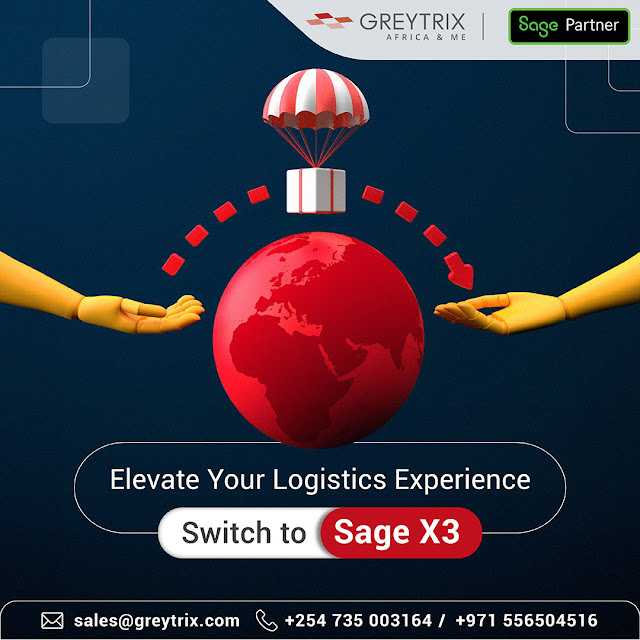Navigating the Future: Innovations in ERP Technology Transforming Transport and Logistics
The logistics and transportation industry is undergoing a major transformation in the rapidly evolving environment of today. This industry faces never-before-seen challenges as globalization picks up speed, customer expectations rise, and worries about sustainability grow. But there are also an immense number of opportunities hidden within these difficulties, especially if cutting-edge enterprise resource planning (ERP) technology is implemented. Innovative ERP systems are reshaping the future of logistics and transportation by improving operations, increasing efficiency, and promoting sustainable growth.
Streamlining Operations with Real-Time Data
In the transport and logistics landscape, efficiency is
paramount. Any delay or error in operations can lead to significant
consequences, from increased costs to dissatisfied customers. Traditional
methods of managing logistics often involve manual processes, leading to
inefficiencies and inaccuracies. However, ERP technology is changing the game
by providing real-time insights and automation capabilities.
Modern ERP systems leverage advanced analytics, IoT devices,
and cloud computing to collect and analyze vast amounts of data from across the
supply chain. This real-time visibility enables companies to optimize routes,
manage inventory effectively, and predict demand accurately. By streamlining
operations and minimizing bottlenecks, ERP solutions help organizations deliver
goods faster, safer, and at lower costs.
Enhancing Customer Experience through Transparency
In today's digital age, customers expect transparency and
visibility throughout the supply chain. They want to track their orders in
real-time, receive accurate delivery estimates, and have easy access to
customer support. ERP technology enables companies to meet these demands by
providing end-to-end visibility and enhancing the customer experience.
Through integrated ERP platforms, customers can track
shipments, receive notifications on delivery status, and access support
services seamlessly. This level of transparency not only improves customer
satisfaction but also builds trust and loyalty. By leveraging ERP technology to
prioritize customer-centricity, transport and logistics companies can gain a
competitive edge in a crowded market.
Driving Sustainability with Data-Driven Insights
As sustainability becomes a growing concern for businesses
and consumers alike, the transport and logistics industry faces increasing
pressure to minimize its environmental footprint. ERP technology plays a
crucial role in this endeavor by providing data-driven insights that enable
companies to optimize resource usage, reduce emissions, and embrace
eco-friendly practices.
By analyzing data on fuel consumption, vehicle utilization,
and route efficiency, ERP systems help identify areas for improvement and
implement sustainable solutions. This may involve optimizing delivery routes to
reduce mileage, transitioning to alternative fuels, or investing in electric
vehicles. Through proactive sustainability initiatives powered by ERP technology,
transport and logistics companies can contribute to a greener future while also
achieving cost savings and operational efficiencies.
Embracing Innovation for Competitive Advantage
In a rapidly evolving industry landscape, staying ahead of
the curve is essential for success. ERP technology empowers transport and
logistics companies to embrace innovation and adapt to changing market dynamics
effectively. By providing a flexible and scalable platform, ERP systems enable
organizations to integrate emerging technologies such as artificial
intelligence, blockchain, and autonomous vehicles into their operations.
For example, AI-powered algorithms can analyze historical
data to optimize delivery schedules and predict maintenance needs, while
blockchain technology enhances supply chain transparency and security.
Meanwhile, autonomous vehicles promise to revolutionize last-mile delivery
operations, reducing costs and increasing efficiency. By harnessing the power
of ERP technology and embracing innovation, transport and logistics companies
can future-proof their businesses and maintain a competitive advantage in an
increasingly digital world.
Conclusion
The future of transport and logistics is being shaped by
rapid technological advancements and changing customer expectations. In this
dynamic landscape, ERP technology emerges as a transformative force, enabling
companies to streamline operations, enhance customer experience, drive
sustainability, and embrace innovation. By leveraging the capabilities of
modern ERP systems, transport and logistics companies can navigate the
challenges of tomorrow with confidence, paving the way for a more efficient,
transparent, and sustainable industry.
For more information on ERP Transportation And Logistics, contact us at sales@greytrix.com or visit Greytrix Africa Ltd.




Comments
Post a Comment